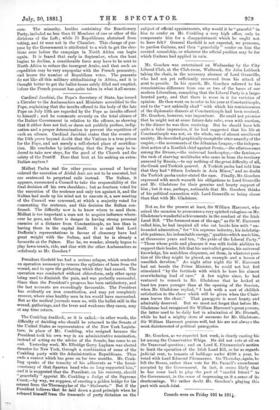Not so, for the present at least, Sir William Harcourt,
who seized the occasion to pronounce a very spirited eulogium on Mr. Gladstone's wonderful achievements in the conduct of the Irish Land Bill. "The foremost man of the age," as Sir W. Harcourt called him, he had inspired all who sat beside him with "un- bounded admiration," for "his supreme industry, his indefatig- able patience, his indomitable energy," qualities which made him, at threescore years and ten, "the pride of the Liberal Party." "Those whose pride and pleasure it was with feeble abilities to support their leader, felt that his unrivalled genius, his universal knowledge, his matchless eloquence, set them, in whatever posi- tion of life they might be placed, an example and a lesson of unselfish devotion." As night after night Sir W. Harcourt had sat beside the Prime Minister, he could not but feel stimulated "by the fortitude with which he bore his almost overwhelming load of care." A few nights since, he had ventured to remark to Mr. Gladstone that he looked at least ten years younger than at the opening of the Session, when Mr. Gladstone replied, "I look with a sort of childish satisfaction to the cheer which will be given when the Chair- man leaves the chair." That panegyric is most hearty and admirably deserved. But we must not forget that before Mr. Gladstone had recognised Sir William Harcourt's great powers, the latter used to be daily lost in admiration of Mr. Disraeli, while he had a mighty store of sarcasms for Mr. Gladstone. Sir William Harcourt praises well, but his are not always the most disinterested of political panegyrics.


































 Previous page
Previous page